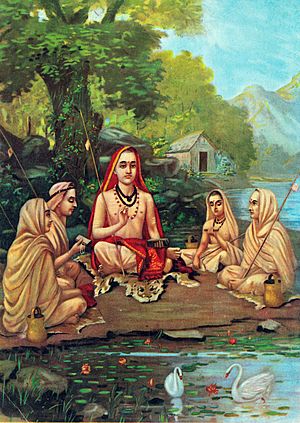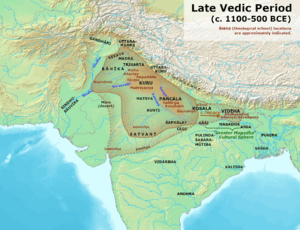Maitreyi facts for kids
Maitreyi (Sanskrit: मैत्रेयी) was an important Indian philosopher who lived a very long time ago, around the 8th century BCE, in ancient India. Her name means "friendly one."
She is mentioned in old Hindu texts like the Brihadaranyaka Upanishad. In this text, she is described as one of two wives of a wise teacher named Yajnavalkya. However, other ancient writings, like the epic Mahabharata, say that Maitreyi was a philosopher who never married. She was known as a brahmavadini, which means a woman who was an expert in the Veda (ancient Hindu scriptures).
Maitreyi is famous for her deep discussions about the Hindu idea of Atman, which means the soul or true self. She talked about this with Yajnavalkya in the Brihadaranyaka Upanishad. In their talks, she explored how love comes from a person's soul. She also discussed the idea that Atman and Brahman (the ultimate reality) are one, which is a main teaching of Advaita Vedanta philosophy.
Maitreyi is a great example of how women in ancient India had chances to learn and become philosophers. She is seen as a symbol of smart Indian women. There's even a college in New Delhi named after her!
Contents
Early Life and Background
Some ancient texts, like the Asvalayana Gṛhyasūtra, mention a scholar named Sulabha Maitreyi. She was the daughter of a wise man named Maitri. Her father lived in the Kingdom of the Videhas, in a place called Mithila. He was an important minister for King Janaka.
There are different stories about Maitreyi. The Brihadaranyaka Upanishad says she was the scholarly wife of the sage Yajnavalkya. His other wife, Katyayani, was more focused on home life. Maitreyi, however, loved to study deep ideas about the universe and have philosophical talks with her husband.
But the Hindu epic Mahabharata tells a different story. It says Sulabha Maitreyi was a beautiful young woman who chose not to marry. Instead, she became a lifelong ascetic, meaning she lived a simple life dedicated to spiritual learning. In this story, she explains the Advaita philosophy (which teaches that everything is one) to King Janaka. Both Maitreyi and Yajnavalkya are thought to have lived around 800 BCE.
Maitreyi is credited with about ten hymns in the Rigveda, one of the oldest Hindu scriptures. She is most famous for her deep discussions about the Hindu idea of Atman (the soul or self). These discussions are found in the Brihadaranyaka Upanishad. This famous conversation is often called the Maitreyi-Yajnavalkya dialogue.
The dialogue explains that true love comes from a person's soul. It also talks about the nature of Atman and Brahman (the ultimate reality) and how they are connected. This idea of unity is a main teaching of Advaita Vedanta philosophy.
This important conversation appears in several Hindu texts. The earliest versions are in chapters 2.4 and 4.5 of the Brihadaranyaka Upanishad. This Upanishad is one of the oldest and most important, dating back to about 700 BCE.
Seeking Immortality, Not Wealth
Yajnavalkya had lived through the first three stages of his life: as a student, with his family, and in retirement. When he became old, he wanted to become a sannyasi, which means someone who gives up worldly things to focus on spiritual life.
He asked Maitreyi for her permission and offered to divide his wealth between her and his other wife, Katyayani. But Maitreyi wasn't interested in money. She said wealth wouldn't make her "immortal" (live forever in a spiritual sense). She wanted to learn about immortality instead.
Here's a part of their conversation:
Then said Maitreyi: "If now, Sir, this whole earth filled with wealth were mine, would I be immortal thereby?"
"No", said Yajnavalkya. "As the life of the rich, even so would your life be. Of immortality, however, there is no hope through wealth."
Then said Maitreyi: "What should I do with that through which I may not be immortal? What you know, Sir – that, indeed, tell me!"
Yajnavalkya replied to Maitreyi: "Ah! Lo, dear as you are to us, dear is what you say! Come sit down. I will explain to you. But while I am expounding, do seek to ponder thereon."—Brihadaranyaka Upanishad 2.4.2–4
In the discussion that followed, Yajnavalkya shared his ideas about immortality, Atman (the soul), Brahman (the ultimate reality), and how they are the same. Maitreyi didn't just listen; she asked questions and challenged parts of his explanation, showing her deep understanding.

Scholars have different opinions about what this dialogue shows. Some believe it proves that women in ancient India were active participants in spiritual discussions and could be scholars. Others see Maitreyi as a character in a story, but still acknowledge her as a very smart woman who asked important questions.
Indian scholars from the first millennium, like Sureshvara, thought this dialogue was very deep. They saw that Maitreyi refused wealth because she wanted to share her husband's spiritual knowledge. Her questions showed she was truly seeking the highest knowledge. Yajnavalkya recognized this and saw her as a true seeker.
This dialogue is important because it highlights how vital the knowledge of Atman and Brahman is. It suggests that giving up worldly desires can lead to understanding the oneness of the soul and ultimate reality.
The Nature of Love
The Maitreyi-Yajnavalkya dialogue also includes a beautiful discussion about love. It suggests that love is a connection of the soul to the universal self. It means that we don't love someone just for their own sake, but because of the connection to the divine soul within them.
Lo, verily, not for love of a husband is a husband dear, but for the love of the Self a husband is dear.
Not for the love of the wife is a wife dear, but for love of the Self a wife is dear.—Brihadaranyaka Upanishad 2.4.2–4
This idea means that all love, whether it's parents loving their children, or people loving their religion or the world, is a reflection of one's own soul. Even the Devas (gods) are loved not for themselves, but because of the Self (Atman) that is within them. When we truly understand our own Self, then everything becomes known.
Yajnavalkya concludes his discussion by telling Maitreyi:
One should indeed see, hear, understand and meditate over the Self, O Maitreyi;
indeed, he who has seen, heard, reflected and understood the Self – by him alone the whole world comes to be known.—Brihadaranyaka Upanishad 2.4.5b
After this deep conversation, Yajnavalkya left to become a sannyasi. Maitreyi also became a sannyassini, meaning she too chose a life of spiritual wandering and giving up worldly things.
Maitreyi's Legacy
Maitreyi is mentioned in many ancient texts called Puranas. She is remembered as one of the most learned and good women of ancient India. She stands for intellectual women in India.
Today, a college in New Delhi is named after her. There is also a place called Matreyi Vedic Village in Tamil Nadu, which is a retreat for spiritual learning.
See also
 In Spanish: Maitreyí para niños
In Spanish: Maitreyí para niños


